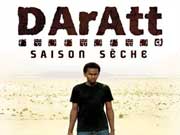
What can we learn as Sri Lankans from this excellent Chadian film that deals so profoundly with the social and personal consequences of civil war, difficulties so similar to our own?
With all the ‘solutions’ offered for Sri Lanka being top-down technical fixes; the piles of bodies, the traumatised population and the sufferings of individuals and their communities remain largely ignored. Persistent ultra-nationalist political propaganda and a feudal obedience to the directives of their rulers appear to have hypnotised much of the population and deprived them of independent thought. Fantasies about ‘peace building’ that were never grounded in practical political mobilisation have not prevented the slow slide back into civil war for over a year now, albeit not yet formally acknowledged. What is desperately needed in the Sri Lankan context is a resurrection of moral responsibility, of conscience and recognition of what we have done to ourselves and to each other.
Daratt, the third feature from Chadian director Mahamat-Saleh Haroun, focuses on unresolved issues that follow the decision of the Chadian Truth and Reconciliation Committee to grant amnesty to all those who robbed, raped and murdered during the country’s 37-year-long bitter civil war. After hearing the radio report of this failure of justice, his blind grandfather gives 16- year-old Atim a revolver and sends him off to kill the man who killed his father. Atim leaves his village for the capital N’djemena, to seek a man he does not know and soon locates him, the former war criminal Nassara who can no longer speak without a device pressed against his throat. Nassara is now married and has settled down as the owner of a small bakery. With the firm intention of killing him, Atim gets closer to Nassara under the guise of looking for work, and is hired as an apprentice. Nassara explains to Atim that bread has to be made with love if it is going to taste good. Intrigued by Atim’s attitude toward him, Nassara takes him under his wing and teaches him the secrets of making bread. Over the weeks a strange relationship evolves between the two. Despite his disgust, Atim seems to recognise in Nassara the father figure he has always needed, while Nassara sees the teenager as a potential son. One day he suggests adoption. The film ends with Atim’s brilliant, silent and unexpected decision which enables him to bring both his grandfather and Nassara a kind of justice, a kind of reconciliation.
When Mahamat-Saleh Haroun moved from journalism to filmmaking, his Bye Bye Africa won the First Feature prize at the Venice Film Festival. In 2002 he directed Abouna (Father) which was selected for the Directors’ Fortnight at Cannes. Of his third feature Haroun says, “Daratt does not emerge from the civil war but from its consequences. What interests me is the landscape after the storm. Life forging on stubbornly amidst fields of ruins and ashes. How can people carry on living together after so much hate and violence? How do you react, faced with such impunity? Resign yourself to it or choose to mete out justice? And if you take the latter path, what does it mean to kill a man?â€Â
As film critic Roy Armes observes, Haroun’s cinematic language relies on ambiguities and absences. Its pervasive quietude and simplicity, which arise organically from the desert landscapes and the primary colours, light and darkness of the city; its violence heard but off screen; and its sparse dialogue; all require imaginative emotional engagement from the viewer. As with great drama down the centuries, what is suggested demands responses from our own experience to resonate with the symbolic and literal story unfolding before us. Daratt’s carefully composed style communicates through small gestures, physical spaces and interactions rather than contrived visual effects.
Daratt emerges, as it were, from the earth, from the personal, from the moral imperatives that make us human. The sensitivity, intelligence and beauty of this film contrasts painfully with the approach we have taken in Sri Lanka where, as George Orwell said in 1946, “Political language is designed to make lies sound truthful and murder respectable, and to give an appearance of solidity to pure wind.â€Â
We Sri Lankans also must create languages through which to address and redress the consequences of our bitter civil war; the disappearances, the torture, the mutilations, the robbery, rape and murder of bodies and of consciences. In a civil war everyone is a hostage, everyone a victim. We cannot continue to be hypocritical about the cost to each of us as individuals and to our society as a whole. Reconciliation and amnesty are not technical devices that can be implanted in our brains through conflict resolution, peace processes or road maps. They must start in the heart; they must be imagined and lived creatively. We need to allow ourselves spaces in which to reflect, rethink, reinvent and heal. Like Haroun, we need to take responsibility, to chronicle our country’s tragedy and shape a sensitive visual language which can regenerate our individual and communal moral capacities and the possibility of a society that can become sane again.
